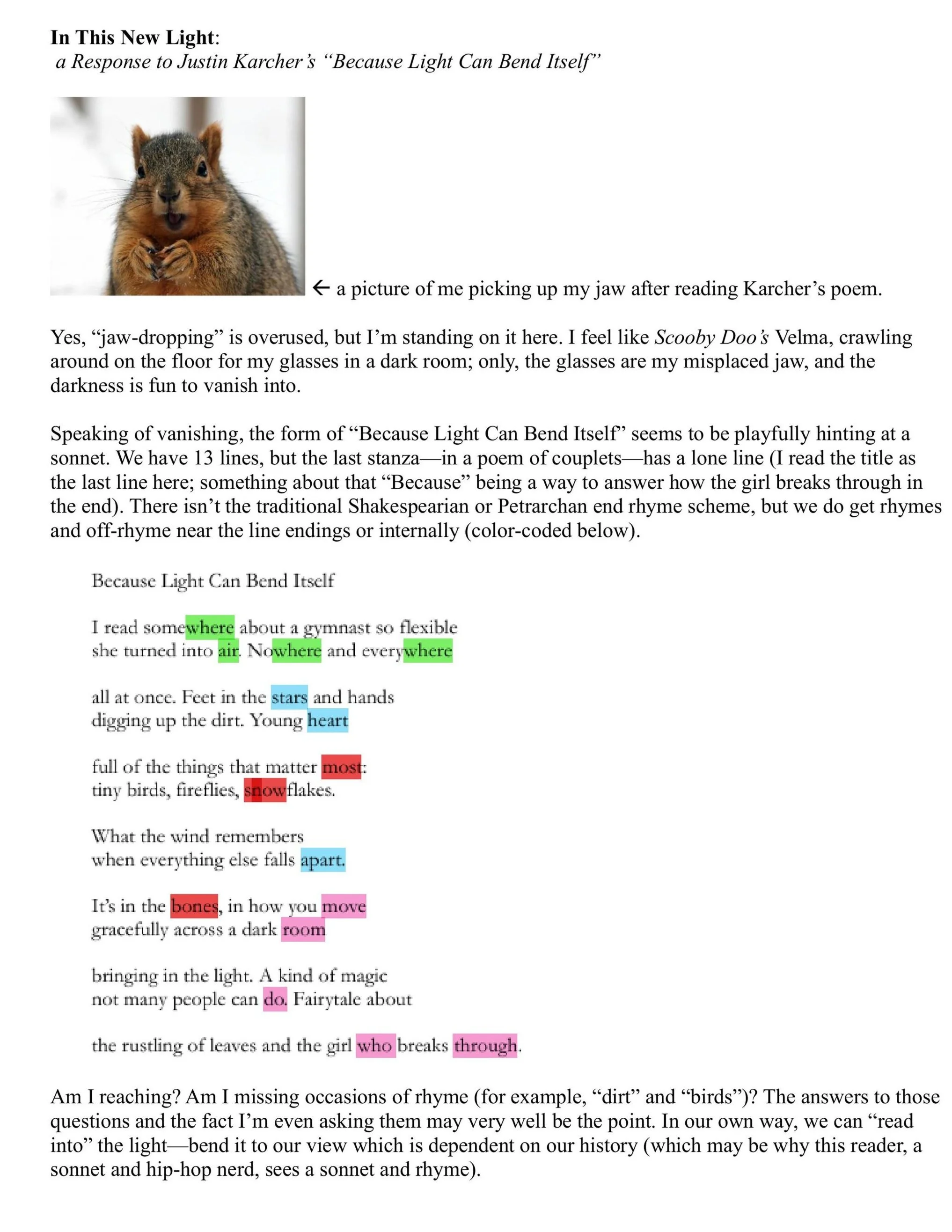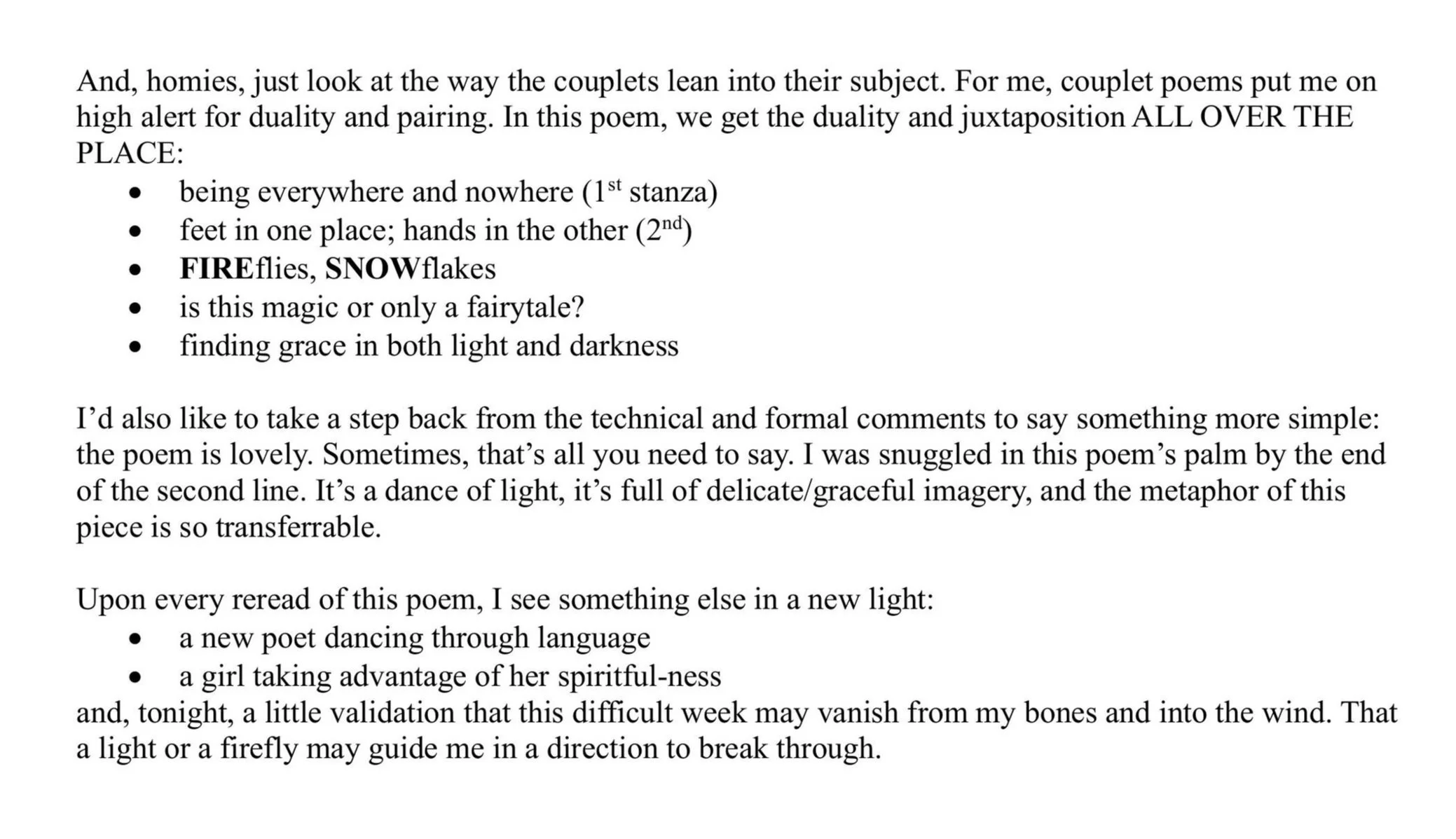Dialogue:
Martheaus Perkins and Justin Karcher
Martheaus Perkins on Justin Karcher’s “Because Light Can Bend Itself”
Justin Karcher on Martheaus Perkins’ “Center, Texas”
Destruction Allows for Renovation, How to Build a Home in Poetry:
Right now I’m at Caffe Aroma, nestled in the heart of the Elmwood Village in Buffalo, NY, nursing a double whiskey as a firetruck circles the block loudly honking at the people sitting outside on the patio. Everyone is jumpy, everyone is looking for that stairway to a heaven of highs. The Labor Day Weekend Saturday vibes in full effect, the kind of vibes that remind you someone is gonna disappear tonight in search of home. The world may never see them again. The lengths we go looking to belong.
I’m fully aware of that search, especially since I moved back with my mom into my childhood double. This was after my divorce and the death of my dad (which happened the same summer!). Every day I see firsthand the metamorphosis of grieving that has transformed my mom into someone who overflows the bathtub until everything is damaged. Grief makes you forgetful, but it also does so with deliberateness. As if this is how we start to recover.
Like waterlogged tiles, our own histories seem to unfold in teardrops until we understand a little more the meaning of home. Poetry, too, functions as destroyer and renovator. Much of the poetry that speaks to my heart digs a home out of the dirt, bulldozes over it and creates something new out of the rubble. But the ghosts always remain, so it may not be so new after all. The least we can hope for then is something that is just a little fresher than we started out with, a quarter of the way to an epiphany. This poetry is often extremely visceral, an attack on your senses, a rotten-smelling teleporter machine that transports you someplace you have never been before. It transforms you both physically and spiritually until you begin to feel differently about everything, and this is what we have with “Center, Texas” by Martheaus Perkins.
A good title takes you somewhere and there’s not much more I can really say about that. I love love love when poets write about their own homes, the places they grew up and came of age, or were confused and saw ghosts. Learning about the unfamiliar birthplaces of other people’s baptisms and exorcisms is the education that brings us all together.
Any great poem, or poems that dig their talons into me, come out of the gate swinging and this poem does just that with a heartbreaking opening couplet, “Granny rescued me from Momma and Houston / after learning we were homeless.” Goddamn. So much packed here in just two lines. An autobiography of the speaker. We have renovation after the destruction of a home, an angel swooping in to pick up the pieces and what’s to follow, we can assume, will be an attack on our senses as something new is constructed out of memory.
Our noses get it the most:
“a stench like an army of musty, dead dogs”
“fungal songs”
“flea market cutlery” (we all absolutely know what that smells like)
“maggot-soaked”
“suspended tumor”
Visually stirring for sure, but this is a poem that riles up the ghosts in our noses until memory conjures a landscape of haunted houses from coast to coast, from little town to little town. All of us have to find a way to rise out of the death, disappointment and sickness all around us and most often, it is a strong woman providing the guiding light with humor, empathy and a keen understanding of how cruel everything can be.
“The four horsemen of funky shit raid our nostrils / Rotten shit, Granny spits. Smells like aftermath / of a Viking horde—men leave their stink.”
Wow. “The four horsemen of funky shit raid our nostrils” is such a damn fine line. I think of my mother, how she has persevered all these years without ever losing her sense of humor or grace. These are the saints who get us through life and suddenly the Buffalo I grew up with, the Buffalo I see everywhere I look, is now in Texas.
And yes, men leave their stink. Sometimes it’s all they do. I think about my late father... and have to put down my drink. Take a deep breath and smell this place all around me.
We cannot help but smell this poem. It’s demanding we take a whiff and look back into the past. Maybe, just maybe, we can figure out the future. What is a poem but a way to do that? What is a poem but “A rat, a dead rat, in a vase it couldn’t climb out of?” How it comes back to life, suddenly and maybe even forcefully, and climbs out of the vase after we’re done reading. When the effects start manifesting. Martheaus is manipulating our sense of smell and we follow the trail and for me, it’s incredibly personal. Toward a different idea of what home can be and maybe something that has been here all along. After the destruction, there must be some kind of renovation.
And sometimes I feel like weeping for the people who have never been positioned on that path. Like my own mother.
“Momma, I see you everywhere.
You were surviving in the wrong direction”
Fuck. Isn’t that what it’s all about? How we have so many loved ones surviving in the wrong direction? What a phrase that will keep me up all night. Tonight, for sure. And most likely through the entirety of this holiday weekend. But after the destruction, there is renovation. There always is. It might not look like it at first, but we get there. If we acknowledge and listen to our senses, we will survive years of surviving in the wrong direction.
See? That’s what happens with poetry. It builds you a home by showing you someone else’s. All the pain and smells and feels that goes into renovating not just a poem, but the very life you call your own. How there can be a home in Western New York that looks awfully similar to a home somewhere in Texas and it’s only sensical to conclude that this is the only way we should build, well, anything.
For each issue, ballast asks pairs of poets to read each other’s work and respond in some way. We hope these dialogues will sound the resonances contained within the issue as well as serve to foster a sense of interconnection and community among our authors.
If you’ve been published in a previous issue of ballast and would like to participate in a dialogue, please reach out to our editors at ballastjournal@gmail.com.

